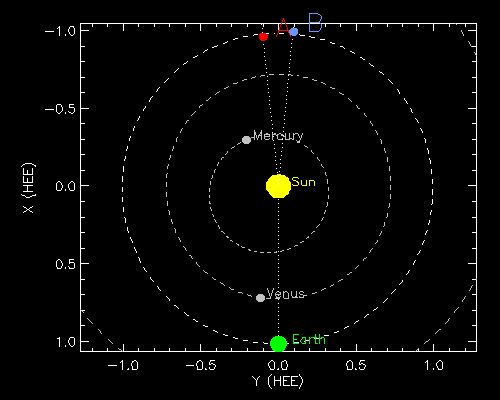|
Periods when STEREO will be behind the Sun
 |
| The positions of the two STEREO spacecraft on
September 1, 2015. |
There will be substantial periods during the year 2015 when one or the other
STEREO spacecraft will be out of contact because its apparent angular distance
from the Sun is too small, or it's even actually behind the Sun. The current
estimates are that the Ahead spacecraft will be out of contact between March 17
and July 14, 2015. The Behind spacecraft has two periods when it is expected
to be out of contact that year, first between January 20 and March 28, and
again between August 25 and October 19. Fortunately, there's only a short
period, March 17-28, 2015, when both STEREO spacecraft are expected to be out
of contact.
These dates depend critically on how much the radio noise from the
Sun interferes with our ability to safely communicate with the spacecraft.
Before the interference from the Sun gets too large, we must put the spacecraft
into a safe mode, and then wait until it's back out of the interference zone to
wake the spacecraft back up again. As we approach the actual period of
conjunction, we'll understand the constraints better, and hope to shorten these
periods of non-contact.
Within these periods of non-contact, there are a few days when the spacecraft
will be physically occulted by the Sun. This happens for Ahead between May
13-27, 2015, and for Behind between February 15-22, 2015.
So, since each spacecraft is hidden by the Sun only once, why are there two
periods in 2015 when we can't communicate with the Behind spacecraft? The
answer has to do with orbital eccentricity. Because the orbits of Earth and
the two STEREO spacecraft are not exactly circular, their angular motion around
the Sun varies a bit depending on the time of year, faster when they're closer
and slower when they're farther away. It just so happens that the combination
of this effect for Earth and Behind makes the Behind spacecraft appear to
move backward temporarily in late 2015. Thus, its angular separation from the
Sun dips back into the anticipated inteference zone for a while. If the
interference zone turns out to be not as bad as currently estimated, then this
second non-contact period may be greatly reduced in duration, or even
eliminated.
After the two STEREO spacecraft pass behind the Sun, they'll essentially be
"upside-down" from their normal orientation. This is done to keep the high
gain antenna pointed towards Earth. At the same time, the SECCHI Heliospheric
Imager cameras will remain pointed at the region between the Earth and the Sun.
Last Revised: Tuesday, 20-Nov-2012 23:47:07 UTC
Responsible NASA Official: ![[email address: Therese.A.Kucera<at>nasa<dot>gov]](/img/kucera_email1.jpg)
Accessibility
Privacy Policy and Important Notices
Feedback and comments: webmaster
|